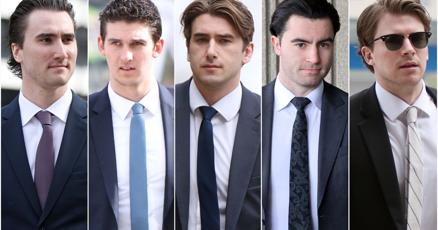In a London courtroom that fell to a devastating silence, a young woman’s voice trembled as she recounted the night that has now placed five former World Junior hockey players at the center of Canada’s most high-profile sexual assault case. “I felt numb… like I was on autopilot,” she testified Tuesday, describing the aftermath of what prosecutors allege was a horrific series of sexual assaults following a Hockey Canada gala in June 2018.
The survivor, whose identity remains protected by a publication ban, delivered gut-wrenching testimony that contradicts the defendants’ claims of consensual sexual activity. Her account details meeting former NHL first-round draft pick Alex Formenton at a London bar before accompanying him to a hotel room where, according to her testimony, she was subjected to degrading acts by multiple men while in a state of extreme intoxication.
“I remember feeling trapped,” she told the court, her voice occasionally faltering as she described fragmentary memories of the night. “There were moments when I couldn’t move… couldn’t speak.” Court documents indicate her blood alcohol level likely exceeded three times the legal driving limit, severely compromising her capacity to consent.
The case has sent shockwaves through Canada’s sporting establishment, raising profound questions about hockey culture and institutional accountability. Hockey Canada faced blistering criticism for its initial handling of the allegations, which included reaching an undisclosed settlement with the survivor before police had completed their investigation. The organization later lost federal funding and major corporate sponsors before undertaking governance reforms.
Legal experts following the trial note its significance extends far beyond sports. “This case represents a critical test of Canada’s sexual assault laws regarding capacity to consent,” says criminal justice professor Maya Richardson. “The court must determine if the complainant was capable of consenting given her level of intoxication, regardless of what words might have been exchanged.”
Defense attorneys have challenged the reliability of the survivor’s testimony, pointing to gaps in her memory and text messages sent in the hours after the alleged assault. However, trauma specialists testifying for the prosecution explained such memory inconsistencies are common in sexual assault survivors, particularly those who were heavily intoxicated during the attack.
The five defendants – Formenton, Dillon Dubé, Carter Hart, Michael McLeod, and Cal Foote – face potential prison sentences of up to 10 years if convicted. All have pleaded not guilty and maintained the sexual activity was consensual.
As the trial progresses, advocates for sexual assault survivors have established support resources outside the courthouse, where daily demonstrations have highlighted the broader societal implications of the case. “This trial isn’t just about these five men,” said women’s rights advocate Janelle Morris. “It’s about accountability in elite sports and whether powerful institutions will protect victims or their own reputations.”
The proceedings, expected to last several weeks, have sparked national conversations about consent, accountability, and the treatment of women in male-dominated sports. As Canadians follow this landmark case, how might it reshape not only hockey culture but our broader societal understanding of consent and responsibility in sexual relationships?










